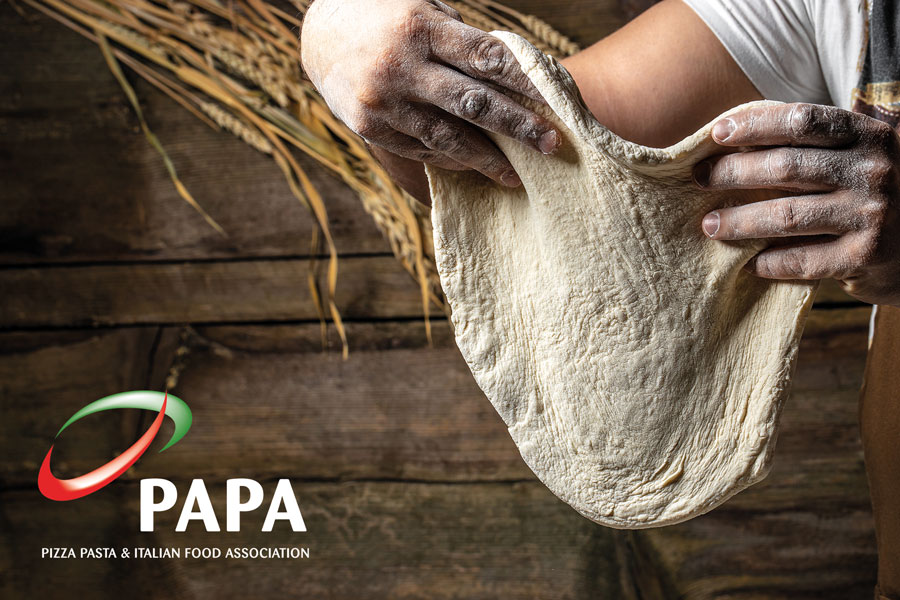A recent report by Action on Salt – a group concerned with salt and its effects on health, supported by 22 expert scientific members – was greatly critical of salt levels in pizza. Here, Jim Winship, director of PAPA (the Pizza, Pasta & Italian Food Association), offers his thoughts on behalf of the organisation.
A BALANCED VIEW
The report on salt levels in pizzas, published by CASH (Consensus Action on Salt & Health), excelled itself in selectively choosing data to make its case.
PAPA decided not to respond to the report publicly, as we did not want to give it greater credence and it seems most of the media saw through it, as it gained little traction in the press. Nevertheless, we would like to put the record straight.
One of the facts buried in the report was the huge amount of work that the industry has done to reformulate pizzas to make them as healthy as possible. Even the government officials responsible for setting health targets recognised this in their last report on salt targets.
This is endorsed to an extent by the report, which does highlight the significant reductions in some pizzas made by Goodfellas and Pizza Express. However, the CASH press release ignored such findings to cherry-pick more sensational claims to try and win media headlines.
Neither did the report recognise that the pizza industry does not deliberately add salt to its products. Salt is an essential ingredient in the making of dough, but otherwise the salt comes from the other ingredients for the toppings, which are popular with some consumers, although they are rarely the volume sellers.
MATTER OF CHOICE
What we will never do is make a claim that pizza is a healthy option – but it does no harm when part of a balanced diet. Furthermore, health is a very individual thing. Some people can eat more than others without doing harm to themselves and, in the case of salt, some need more than others. Athletes and those taking exercise require more than the recommended average daily intake, for example.
Neither can we dictate to consumers what they can or cannot eat. We live in a free society where people rightly make their own choices – whether that’s to indulge on a Friday night, or eat a whole pizza rather than a recommended portion.
To try and dictate to consumers what they can buy would be suicidal for any business. At the same time, our industry has expressed its desire to work with government to help consumers make healthier choices more easily. We are equally willing to work with CASH to this end, but not by publishing misleading reports simply to grab headlines.
The following are some of the ‘facts’ that CASH chose to ignore. In the case of retail/manufactured pizza, they did not highlight that their research showed that 85% of the pizzas they sampled met current government targets. Are they suggesting that businesses should not allow consumers to purchase any product that goes over the target?
The fact that they randomly took data from packs puts into question the whole of their argument, as it takes no account of sales volume. One pizza might have a very high salt content, but not sell in any volume. Particularly in cases where only a small number of pizzas were sampled from a particular retailer, this can distort data considerably.
It appears that samples were not managed fairly. We are not aware, for instance, that Sainsbury’s has 52 varieties of pizza on offer – or Domino’s 426! This implies the same varieties were multiplied in some cases to get to the data they wanted, while others were selectively chosen. Contrarily, only two were chosen to be included from some other retailers. Domino’s must be livid at being so unfairly quoted.
With foodservice, in most cases the samples were too small to be meaningful. With Franca Manca and Zizzi, for instance, they included data of only four products. The low level of sampling raises questions over the accuracy of statements, such as 57% failing to reach targets.
TEAM EFFORT
The report goes on to demand that the government introduces a levy on companies failing to meet salt-reduction targets and for these to be mandatory. In other words, remove the right of consumers to make choices.
Where we agree with the report is in its recommendations for consumers – to read nutrition labels and manage diets.
Unless consumer demand changes, there is a limited amount that businesses can do to alter habits. To do so against the tide of consumer opinion would be commercially suicidal. However, by working together, we can help shift demand and make real change for the long term, through a combination of education, awareness and clear, unambiguous labelling.


